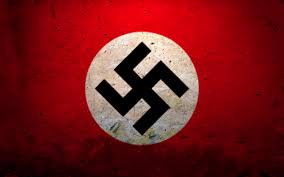Nazi

n. 纳粹党人;纳粹主义信徒
adj. 纳粹党的;纳粹主义的
n. (Nazi)人名;(布基)纳齐;(俄)娜济
n.
(德国的)纳粹党员;纳粹主义;纳粹主义信徒;
adj.
纳粹党的;纳粹主义的;
变形
复数:Nazis
英英释义
Nazi[ 'nɑ:tsi, 'næ- ]
n.
a German member of Adolf Hitler's political party
同义词:German Nazi
an offensive term for a person who is fanatically dedicated to, or seeks to control, some activity, practice, etc.
adj.
relating to or consistent with or typical of the ideology and practice of Nazism or the Nazis
relating to a form of socialism
同义词:national socialist
双语例句
用作形容词(adj.)
Hitler is the founder of the German Nazi Party.
希特勒是德国纳粹党的创始人。
Many people had to emigrate during the Nazi period.
在纳粹党期间许多人不得不移民。
权威例句
Becoming a Nazi: A model for narrative networks ☆The Nazi Doctors: Medical Killing and the Psychology of Genocide
The Nazi Doctors: Medical Killing and the Psychology of Genocide by Robert Jay Lifton
Sleep disturbances in survivors of the Nazi Holocaust.
The altruistic personality: Rescuers of Jews in Nazi Europe.
Henry Friedlander, The Origins of Nazi Genocide: From Euthanasia to the Final Solution
The Nazi Doctors and the Nuremberg Code: Human Rights in Human Experimentation by George J. Annas; Michael A. Grodin
The wages of destruction: the making and breaking of the Nazi economy - By Adam Tooze
A Statement of Principles. (Book Reviews: The Nazi Doctors and the Nuremberg Code. Human Rights and Human Experimentation.)
The Origins of the Final Solution: The Evolution of Nazi Jewish Policy, September 1939-March 1942 by Christopher Browning; Juergen ...
Nazi
1930, noun and adjective, from German Nazi, abbreviation of German pronunciation of Nationalsozialist (based on earlier German sozi, popular abbreviation of "socialist"), from Nationalsozialistische Deutsche Arbeiterpartei "National Socialist German Workers' Party," led by Hitler from 1920. The 24th edition of Etymologisches Wörterbuch der deutschen Sprache (2002) says the word Nazi was favored in southern Germany (supposedly from c. 1924) among opponents of National Socialism because the nickname Nazi, Naczi (from the masc. proper name Ignatz, German form of Ignatius) was used colloquially to mean "a foolish person, clumsy or awkward person." Ignatz was a popular name in Catholic Austria, and according to one source in World War I Nazi was a generic name in the German Empire for the soldiers of Austria-Hungary. An older use of Nazi for national-sozial is attested in German from 1903, but EWdS does not think it contributed to the word as applied to Hitler and his followers. The NSDAP for a time attempted to adopt the Nazi designation as what the Germans call a "despite-word," but they gave this up, and the NSDAP is said to have generally avoided the term. Before 1930, party members had been called in English National Socialists, which dates from 1923. The use of Nazi Germany, Nazi regime, etc., was popularized by German exiles abroad. From them, it spread into other languages, and eventually was brought back to Germany, after the war. In the USSR, the terms national socialist and Nazi were said to have been forbidden after 1932, presumably to avoid any taint to the good word socialist. Soviet literature refers to fascists.
1. a Nazi meeting, newspaper
纳粹的集会、 报纸.
-- 来源 -- 汉英 - 翻译参考
2. Nazi Party
纳粹党
-- 来源 -- 英汉 - 短句参考
3. I thought the nazi would be a nazi.
我想这个纳粹真的会成为一个纳粹.
-- 来源 -- 电影对白
4. The former Nazi was denaturalized.
前纳粹党被开除国籍了。
-- 来源 -- 汉英 - 翻译参考
5. Judeo Nazi Junta
犹太纳粹政权
-- 来源 -- 英汉 - 翻译参考[网络]
6. neo-Nazi Zionist policy
新纳粹犹太复国主义政策
-- 来源 -- 英汉 - 翻译参考[网络]
7. American Nazi Party
美国纳粹党
-- 来源 -- 英汉 - 翻译参考[网络]
8. make Nazi in character.
在性质上成为纳粹党人。
-- 来源 -- 汉英 - 翻译参考
9. free from Nazi ideology.
从纳粹形态中解放出来。
-- 来源 -- 汉英 - 翻译参考
10. The psychohistory of the Nazi era.
纳粹时代的心理历史
-- 来源 -- 英汉 - 短句参考
